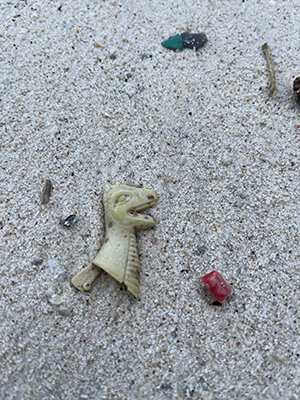Plastic Temporalities and the Materiality of Connection on Christmas Island
 Presentation by Saskia Adelle Abrahms-Kavunenko, CCBS, Department of Cross-Cultural and Regional Studies. Discussant: Trine Brox, Associate Professor, CCBS, Department of Cross-Cultural and Regional Studies.
Presentation by Saskia Adelle Abrahms-Kavunenko, CCBS, Department of Cross-Cultural and Regional Studies. Discussant: Trine Brox, Associate Professor, CCBS, Department of Cross-Cultural and Regional Studies.
Short introduction
On Christmas Island, an Indian Ocean Australian external territory, temporal cycles are significantly defined by the monthly arrivals of packaged food on ships and the bi-weekly arrival of planes carrying fresh food, locals, fly-in fly-out workers, tourists, and medicine. The predictable rhythms of the Gregorian calendar recede with the start of the rainy season, as planes become unable to land on rainy days and ships can’t dock during the seasonal swell. The Lunar calendar determines ritual cycles for the local Chinese and Malay communities, including festivals that give offerings to the island’s ancestors and those trapped in the realm of hungry ghosts. As the rainy season begins and follows the cycles of the moon, the red crab migration sees 60 million crabs move across the island to mate and lay their eggs. The migration changes life on the island by blocking roads, prompting care, and affecting the workings of the island’s phosphate mine.
This presentation will explore how the movements of animals, ancestors, ghosts, and people are influenced, disrupted and facilitated by the presence of plastics, as they arrive on the island as packaging for food, religious offerings, and other consumables, and as they inundate the island’s eastern beaches. Although an increasing number of plastics have been made to be used and discarded as if they were essentially ephemeral, transforming the decayed matter of the past into the mass production of plastics has created a material that stubbornly persists. By looking at how people use and are inundated with plastic items, this talk will investigate how the inhabitants of Christmas Island view their autonomy and/or enmeshment, both economically and temporally, in a world where plastics effortlessly cross boundaries, through trade networks and with the currents of the Indian Ocean.
Bio
Dr Saskia Abrahms-Kavunenko is an anthropologist and the author of Enlightenment and the Gasping City. Her work is situated at intersections between environmental changes and cultural praxis, in multi-scalar and trans-species contexts. She has carried out extensive research on Buddhism and other religious traditions in Australia, Mongolia, and India, particularly as they relate to uncertainty, pollution, and the more-than-human world. She is currently working on the Waste: Consumption and Buddhism in the Age of Garbage project within the Center for Contemporary Buddhist Studies. Her current research project ‘Impermanent – Imperishable: Plastics and Praxis among Buddhists in Oceania’ looks at how Buddhists in Oceania relate to radical permeability and toxicity amidst the changing ecosystems on the planet.
Map of South Campus
View directions.
View on map of the Faculty of Humanities - South Campus.
View map of South Campus (pdf).
